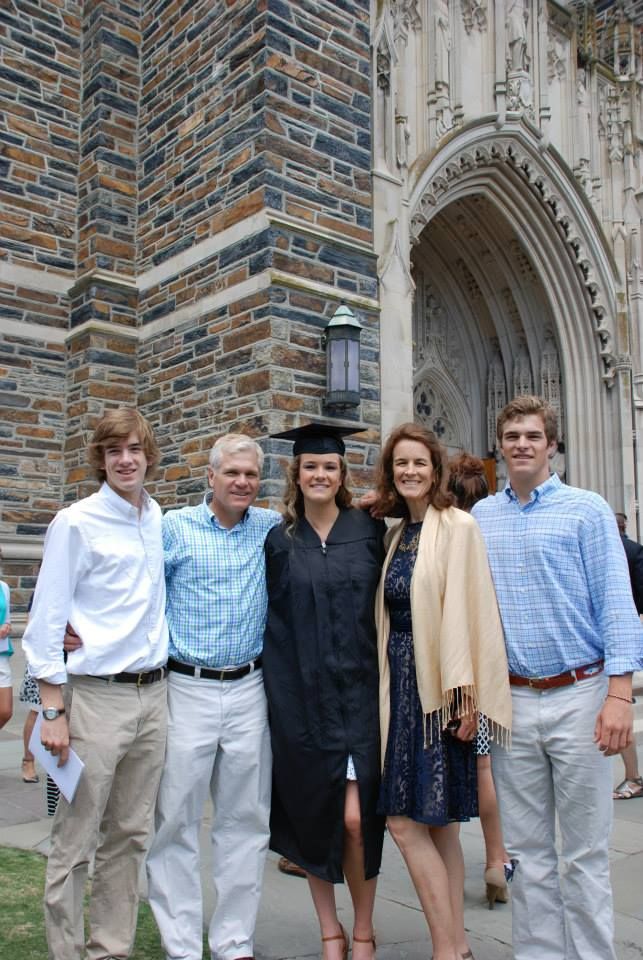Caralena Peterson hopes to empower today's female undergraduates. Video by Emily Frachtling
It’s a feeling she first noticed as a college student – the intense pressure to accomplish it all but seem as if it took no effort. And it’s a feeling Caralena Peterson ‘15 wants other female undergraduates to cast aside.
During her time at Duke, Peterson learned about a term that captured her feeling: “effortless perfection,” a phrase used by Duke students that caught national attention after it was cited in the 2003 Duke Women’s Initiative Report.
The report, commissioned by former Duke president Nannerl O. Keohane, aimed to understand and improve campus culture for women. The findings pointed to a social environment with unreasonable expectations for women: “that one would be smart, accomplished, fit, beautiful and popular, and that all this would happen without visible effort.”

“Effortless perfection is definitely not just a Duke thing; it plagues college students in any high-intensity/high-expectation environment,” Peterson writes in her book,
The resulting effect on young women isn’t just superficial, argues Peterson. Through her research and peer interviews for the book, she demonstrates how the idea of
“I really want

In her book – with advice that comes from her experiences but holds true for contemporary times with examples from social media and
Identify Counter-Narratives
“The first step to pushing back against the dominant narrative of effortless perfection on college campuses is by identifying counter-narratives,” Peterson writes.
Counter-narratives show honesty over pretense. In her book, Peterson discusses the #halfthestory campaign on Instagram, started by Vanderbilt student Larissa May, where individuals share experiences beyond what’s considered the curated norm on social media.
Authentic stories, Peterson says, can help others realize they’re not alone in their struggles and more easily recognize unreasonable standards (see Peterson’s chapter, “Is There Any Right Way for a Woman To Be Assertive?”).
“It’s the thought of,
Learn Positive Ways to Get Motivated
Failure stings but avoiding it doesn’t have to be all-consuming. Become pulled by your passions and not pushed by fear or anxiety, Peterson advises.
“I think what's really important for college students and people who struggle with these kinds of pressures is to ask themselves, ‘Where are my motivations coming from?’” Peterson says.

During her interviews for the book, Peterson asked when her peers
“When they had that experience, it was totally debilitating,” Peterson says. “It
Don’t build your sense of identity on never failing, Peterson says. “I get it, because I've done it
Find A Place to Be Honest
For Peterson, finding other students she could be herself around made all the difference,
Students can also take advantage of access to mental health professionals.
“There are resources that are available to you on Duke’s campus,” Peterson says. “When I had my first anxiety attack, I walked myself over to CAPS.”
It’s important to spend some time acknowledging how you’re feeling, Peterson says.
“Journal, meditate and have your check-in person,
Learn more about “The Effortless Perfection Myth.”
Fall 2022 Wellness & Resilience Series Presented by Duke Counseling and Psychological Services (CAPS)
- Sept. 27: Hit the Snooze Button: Sleep is Your Superpower
- Oct. 4: Be Your Own Hypnotist
- Oct. 18: Take Back Your Confidence: You Belong Here
- Oct. 19: Reclaim Your Time!
- Oct. 25: Power Up Your Productivity
- Oct. 26: Unwind Your Mind: A Toolkit for School/Life Balance
Duke Gender Violence Intervention Services
For confidential therapy services and clinical case management needed because of violence, students can walk-in/call-in to *CAPS M-T 9-6 and W-F 9-4. Students may also contact the coordinator directly, GVICoordinator@duke.edu or 984-569-0592
Students seeking services after hours have three options for support:
- Confidential support: leave a voice mail with the GVI Coordinator (984-569-0592) or email GVICoordinator@duke.edu. Students will be contacted within 24 hours or sooner if necessary.
-
Non-confidential support and reporting through the Dean On-Call 984-287-0300 or DUPD 919-684-2444. (Seeking support from a non-confidential resource will result in outreach from Duke University.)
-
Students may also access local resources through Durham Crisis Response Center. Students can also utilize the help line at 919-403-6562.